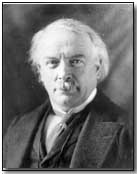Primary Documents - Lloyd George on Foch's Appointment as Allied Supreme Commander, 30 March 1918
 Reproduced below is the
text of the official statement issued by British Prime Minister
David
Lloyd George on 30 March 1918. In his statement Lloyd
George confirmed that British, French and U.S. forces were to act under the
coordination of
Ferdinand Foch.
Reproduced below is the
text of the official statement issued by British Prime Minister
David
Lloyd George on 30 March 1918. In his statement Lloyd
George confirmed that British, French and U.S. forces were to act under the
coordination of
Ferdinand Foch.
The decision to transfer overall command to Foch had been taken earlier by Allied government representatives at Doullens on 26 March. This was in response to sweeping German territorial advances following the opening of their key Spring Offensive which open on 21 March 1918.
Click here to read a follow-up statement by Lloyd George on the same subject dated 9 April 1918. Click here to read U.S. Commander-in-Chief John J Pershing's official despatch regarding Foch's assumption of overall military command. Click here to read the text of his address to Foch on the matter on 28 March.
Statement Issued by Lloyd George on Foch's Appointment as Allied Supreme Commander, 30 March 1918
For the first few days after the German Army had launched upon our lines an attack unparalleled in its concentration of troops and guns the situation was extremely critical.
Thanks to the indomitable bravery of our troops, who gradually stemmed the enemy advance until reinforcements could arrive and our faithful Ally could enter into the battle, the situation is now improved.
The struggle, however, is still only in its opening stages, and no prediction of its future course can yet be made.
From the first day the War Cabinet has been in constant session and in communication with Headquarters and with the French and American Governments. A number of measures have been taken in concert between the Governments to deal with the emergency.
The enemy has had the incalculable advantage of fighting as one army. To meet this the Allies have, since the battle began, taken a most important decision.
With the cordial cooperation of the British and French Commanders-in-Chief, General Foch has been charged by the British, French, and American Governments to coordinate the action of the Allied Armies on the Western front.
In addition to the action taken to meet immediate needs of the moment, it will be necessary to bring into operation certain measures which have long been in contemplation should a situation such as the present arrive.
It is clear that, whatever may happen in this battle, the country must be prepared for further sacrifices to insure final victory. I am certain that the nation will shrink from no sacrifice which is required to secure this result, and the necessary plans are being carefully prepared by the Government and will be announced when Parliament meets.
Source: Source Records of the Great War, Vol. VI, ed. Charles F. Horne, National Alumni 1923
Duck-Boards comprised slatted wooden planking used for flooring trenches or muddy ground.
- Did you know?
